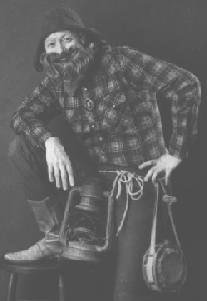How We Make the Scenery


Dear Aaron, Craig, Bryan Brobst, Autumn and Ashley,
What great questions about scenery from all of you. I'll try to answer as many as I can.
Step 1: When you read a play, in your mind (imagination) you get thoughts about where the play is taking place. We imagined "Simple Simon" taking place in the center of a town in England.
 Step 2: You then draw your ideas on paper and then you color your
drawing.
Step 2: You then draw your ideas on paper and then you color your
drawing.
Step 3: Now you are ready to make the "scenery". For "Simple Simon" we use what is called a "drop"--they call it that because in big theatres they could actually drop it down from the ceiling (sort of like a window shade! We will have it haning on poles though). It is really just a HUGE piece of cloth(muslin it is called), on which you then draw your picture (much BIGGER, of course, and that is what is hard and takes training to learn to do.) Next you paint it. Then your picture is finished.
Step 4: There is one other thing we do with stage scenery--we "texture it"(I know that is a hard word) and we do that by--ready for this--taking watered down paint, dipping a small paint brush in the paint and sprinking the whole scenery with it so that little teeny tiny drops appear all over the scenery. We do this so that when the bright stage lights shine on the scenery it doesn't look "Blah" or washed out. Can you imagine making a painting and then sprinkling it with little spots?? But it does work!!!
 Mrs. Wills, designed (thought up) drew and painted the "drop" which we
will use in "Simple Simon".
Mrs. Wills, designed (thought up) drew and painted the "drop" which we
will use in "Simple Simon".
Another way to make scenery is to build a wood frame and stretch the cloth (muslin) over it and then draw and paint on it.
There are many, many different types of scenery, but these are two of the most common. We do bring all the scenery in our trailer, while Mrs. Wills and I ride in the van.
My favorite color is blue; Mrs. Wills likes many different colors.
Hope this helps.
Your friend,
Prospector Parker
Dear Roxy:
First, yes, we love doing shows, especially shows for young people like yourself. I hope our shows not only make you happy, but teach you some things as well. To find out what Mrs. Wills does, please read one of my earlier letters. Mr. Wills writes all the shows, and Iof my earlier letters. Mr. Wills writes all the shows, and I (Prospector Parker) make sure it all gets done correctly.
Your friend,
Prospector Parker